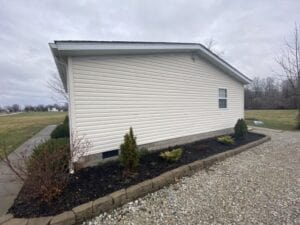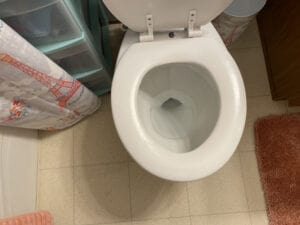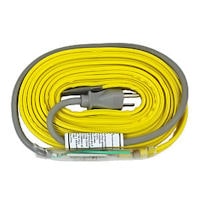Frozen pipes, mobile home two words when combined together that can be a major issue. Unfortunately, frozen pipes are a fairly common occurrence in the winter months for mobile homes.
Not only can they cause inconvenience and discomfort, but they can also pose a fire hazard if left unattended. In this blog post, we will discuss the importance of preventing frozen pipes in a mobile home and provide some useful tips to help you avoid this problem.
Keep reading to learn how you prevent frozen pipes in your manufactured home this winter.
Frozen Pipes in Your Mobile Home
Manufactured home pipes freeze because they are often surrounded by thin skirting. This skirting appears like vinyl siding, and it allows the air to move easily through it. Your pipes endure changes in temperatures. So you should be conscious of pipes freezing as soon as the temperature begins to drop.

Mobile home foundations such as cinder blocks or poured concrete foundations protect mobile homes from the outside elements during cold weather.
While the most obvious sign will be lack of water, if you’re looking at the pipes themselves you may also be able to see frost. The pipe may be a different color, or you can try hitting the pipe with a metal object (such as a screwdriver). If the pipe sounds solid, there’s a good chance that water is frozen inside, and you’ve located a frozen spot.
How to Unfreeze Pipes in a Mobile Home
Mobile Home Heat Tape
1.Use heat tape. One of the best ways to prevent your pipes from freezing in the first place is by using heat tape. Heat tape is a cord or heat cable that is encased in electrical wiring. It helps your pipes to regulate their temperature during the colder months. Heat tape is powered, so you’ll need an outlet to plug it into. This is an incredibly popular way to prevent any issues or damage because it’s effective.
Order your heat tape here and it will be shipped directly to your doorstep. Heat tape is one of the most effective ways to keep your pipes open and clear.
2. Leave the water running.
If you’re in for particularly cold weather, try leaving your faucets on a trickle before you head to bed. This can not only prevent freezing but break up any ice that does form. That steady flow of water will make a big difference in the morning when you go to make coffee or take a shower.
3. Add insulation.
If you don’t already have insulation under your manufactured home to help keep you warm, you may want to add it to help keep your pipes nice and toasty. Not every climate requires insulation, but if you find that your pipes are freezing time and time again, this can be yet another way to prevent catastrophe. Spiral-wrap, fiberglass, and foam are all among the different types of insulation available.
Read more here on our article Insulation Under A Mobile Home.
4. Investing in thermal curtains can help keep warm air inside and cold air out.
5. Another helpful tip is to use a space heater to supplement your home’s heating system and keep specific areas warm. This is particularly important if you live in an area that experiences extreme cold temperatures.
6. If you aren’t going to be living in your mobile home winterizing your mobile home is also crucial in preventing frozen pipes. Follow a step-by-step guide that includes checking insulation and sealing any drafts around windows or doors.
Read our article here How To Winterize a Mobile Home and get our free winterize mobile home pdf.
It’s important to note that frozen pipes are not just a problem for first-time homeowners; even experienced ones may encounter this issue. Therefore, it’s always better to be prepared than sorry.
Unfreezing Pipes in Walls and Mobile Homes:
Tips and Tricks
Regular plumbing maintenance is crucial in ensuring the proper functioning of your plumbing system. Neglecting regular maintenance can lead to blockages, leaks, and water damage. This can be costly to repair. In this section, we will discuss some tips and tricks on how to unfreeze pipes in walls and mobile homes.
Firstly, it’s important to identify whether you have a frozen pipe or not. Signs of a frozen pipe include no water coming out of the faucet when turned on. Also strange noises coming from the pipes, or visible frost on the exterior of the pipes are a sign. If you suspect that you have a frozen pipe in your wall or mobile home, here are some tips on how to thaw it:
Turn up the heat: Increase the temperature in your home by turning up the thermostat. This will help warm up any areas where pipes may be located.
Use a space heater: If you know where the frozen pipe is located, use a space heater to direct heat towards that area.
Apply heat directly: You can also apply heat directly to the frozen pipe using a hair dryer or heating pad. Be sure not to leave these items unattended while they are running.
Open faucets: Turn on any faucets connected to the frozen pipe so that as it thaws, water can flow through and prevent pressure buildup.
Be Careful with Frozen Pipes
It’s important not to use any open flames (such as a blowtorch) when attempting to thaw a frozen pipe. This can be dangerous and start a fire.
A maintenance crew can inspect and repair any issues with your plumbing system including the main water line, supply line, faucets and other parts. Regular maintenance can also prevent root problems from damaging your pipes and producing water blockages. Investing time and money into regular maintenance can save you from costly repairs and ensure that your plumbing system works efficiently for years to come.
How to Keep Pipes From Freezing
Hopefully the tips above will keep your pipes from freezing. In extremely low temperatures it makes it difficult to keep your pipes warm. Walk around your mobile home and make sure all the skirting is in place. Just one hole in the skirting can bring in unwanted cold air and critters.
Keep the Thermostat at a Consistent Temperature
Another way to prevent frozen pipes is by keeping the thermostat at a consistent temperature throughout the day and night. This will help to maintain a steady flow of warm air and prevent your pipes from freezing.
During extremely cold weather, it’s important not to turn down the thermostat at night or when you’re away from home. Doing so could cause your mobile home’s interior temperature to drop below freezing, which could lead to frozen pipes.
Seal Any Air Leaks in Your Mobile Home
Air leaks are another common cause of frozen pipes in mobile homes. Cold air can enter through gaps around doors and windows, as well as through cracks in walls and ceilings.
To prevent cold air from entering your mobile home, it’s important to seal any air leaks using caulk or weatherstripping. You should also check for gaps around plumbing fixtures like sinks and toilets, as these can also allow cold air into your home.
Checking the Skirting and Underlayment for Holes: Importance of Checking the Underlayment
Holes in the skirting and underlayment can allow cold air to enter and freeze pipes.
One of the most important things to consider is the condition of your skirting and underlayment. These two components work together to protect your home from the elements, but they can also be a source of trouble if they’re damaged or deteriorating. One common issue that can lead to frozen pipes is holes or gaps in either the skirting or underlayment. When cold air is able to enter through these openings, it can cause temperatures inside your home to drop dramatically, which can then lead to frozen pipes.
Checking the underlayment is important
This is because it provides insulation and protects against moisture. While both the skirting and underlayment are important for protecting your mobile home from outside weather conditions, it’s especially crucial to pay attention to your underlayment if you want to prevent frozen pipes. This layer of material sits between your flooring and subflooring, providing insulation and protection against moisture. If there are any holes or gaps in this layer, however, cold air can easily seep through and wreak havoc on your plumbing system.
The underlayment should be securely fastened
This will to prevent it from shifting or tearing. To ensure that your underlayment is doing its job properly, you’ll need to inspect it regularly for signs of damage or wear. Make sure that it’s securely fastened in place so that it doesn’t shift around or tear over time. If you do notice any holes or gaps in the material itself, be sure to patch them up as soon as possible with tape or caulk so that cold air doesn’t have a chance to get inside.
Any holes or gaps in the underlayment should be sealed
This should be done with tape or caulk to prevent drafts. Sealing up any holes or gaps in your underlayment might seem like a small detail, but it can make a big difference in preventing frozen pipes. Even tiny openings can allow cold air to seep through, so be sure to use a high-quality tape or caulk to seal up any gaps you find. This will help keep your home warm and cozy even on the coldest of days.
It’s also important to check the roof for any leaks
Water leaks can cause water damage and lead to frozen pipes. While checking your skirting and underlayment is an important step in preventing frozen pipes, don’t forget about your roof! Leaks in your roof can cause water damage inside your home, which can then lead to frozen pipes if temperatures drop low enough. Make sure that your roof is in good condition and free from any leaks or damage so that you don’t have to worry about this potential problem.
Regularly inspecting the skirting, underlayment, and roof
This can help prevent frozen pipes and costly repairs. By taking the time to regularly inspect all of these components of your mobile home, you’ll be able to catch any potential issues before they turn into major problems. Preventing frozen pipes requires a bit of effort on your part, but it’s well worth it when you consider the cost and hassle of dealing with burst pipes. So take some time today to check out your skirting, underlayment, and roof – your plumbing system will thank you!
Mobile Home Water Lines: Frozen Pipes Mobile Home
Water lines under mobile homes can be easily exposed to the weather. During warm months you will want to do some maintenance under your home and make sure it is well insulated. This will help to ensure that your mobile home is secured. If you find that you have water under your mobile home you might read our article Water Leak Under a Mobile Home.
Frozen Pipes and Damage
If your mobile home pipes have become frozen try to get them fixed ASAP. Frozen pipes can cause serious damage to the lines. When the ice expands within the water lines it can cause them to bust which can be very expensive to fix.
Locating the Frozen Section of the Pipe
To insulate frozen pipes, you first need to locate the section that is frozen. Signs of a frozen pipe include bulges or leaks in the walls surrounding the piping. You can also check for frost on exposed pipes or water risers. Once you have located the frozen section, turn off your water supply to prevent further damage.
Unfreezing Your Pipes
Now it’s time to unfreeze your pipes. One way to do this is by using a hairdryer or heat lamp. Start at the end closest to your faucet and work your way down towards the frozen section, using gentle heat to defrost any ice blockages. Be sure to avoid open flames or high heat sources that could damage your pipes or start a fire.
Checking for Leaks
Once you have successfully unfrozen your pipes, it’s important to turn on your water supply and check for leaks. If there are no leaks, congratulations! Your pipes are back in working order. However, if you do find leaks, be sure to take care of them immediately before they cause further damage.
Frozen Pipes Mobile Homes: Additional Ways to Keep Your Pipes From Freezing
Insulating Your Pipes
To prevent future freezing, consider insulating both your walls and pipes with pipe insulation. This will help keep heat inside and protect against cold drafts that can cause freezing. PVC pipes are especially vulnerable to cold temperatures and should be insulated as well.
Best Way To Insulate Problem Pipes
The best way to insulate problem pipes is by wrapping them with foam insulation sleeves made specifically for piping. These sleeves come in various sizes and can be easily cut down to fit around any size pipe.
Drip Faucet Method
Another method of preventing freezing is by letting your faucets drip slightly during extreme cold weather conditions. This keeps water flowing through your system and prevents it from sitting stagnant in one spot where it could freeze over time.
Frozen Pipes Mobile Home: Installing Heat Tape
As mentioned above heat tape is going to be one of your best bets to keep your mobile home pipes from freezing. Installing heat tape is relatively simple and straightforward. First, you’ll need to measure the length of the pipe you want to wrap with heat tape. Next, purchase enough heat tape for your specific needs (it’s always better to have too much than not enough). Then, wrap the heat tape around the pipe according to manufacturer instructions and secure it with electrical tape or zip ties.
Ensuring Good Condition of Heat Tape
When applying heat tape, it’s important to make sure that the tape is in good condition and not damaged. Over time, heat tape can wear out or become damaged, which can render it ineffective. If you’re using old heat tape, it may be time to replace it with new heat tape to ensure it’s working properly.
Testing Heat Tape
To test if your heat tape is working, use a heat gun to check the temperature of the pipe where the tape is applied. The ideal temperature should be above freezing (32 degrees Fahrenheit). If not, you may need to reapply or replace the tape.
Securing Heat Tape
It’s also important to make sure that the heat tape is securely fastened to the pipe and any gaps are covered with additional tape. This will help ensure that there are no exposed areas where cold air can seep through and cause freezing.
In addition to using heat tape, there are other steps you can take to prevent frozen pipes in cold weather. These include keeping warm water running through your pipes at all times (even just a trickle), insulating exposed pipes with foam insulation sleeves or wrap, and sealing any gaps or cracks around windows and doors that could let cold air into your home.

By taking these preventive measures, you can avoid costly repairs due to frozen pipes and keep your home warm and comfortable during even the coldest winter months.
Other Tips for Keeping Your Mobile Home Warm During Winter
In addition to using heat tape on your pipes, there are several other things you can do to keep your mobile home warm during winter:
Regular Plumbing Maintenance: Importance of Maintaining Your Plumbing System
Pouring salt down the drain is a method for thawing frozen pipes. One of the most common problems that homeowners experience is frozen pipes. While this issue can be mild or severe, it’s essential to act quickly to prevent further damages and expenses. One effective method for thawing frozen pipes is pouring salt down the drain. Salt has a lower freezing point than water, which makes it easier to dissolve ice and unblock the pipes. This method is useful for mild to moderate freezing and can save you time and money if done correctly.
Salt Down the Drains
To use this method, pour a generous amount of salt down the drain and wait for it to dissolve. Repeat the process until the water starts to flow freely again. However, keep in mind that this method may not work for severe blockages or root problems in your plumbing system. In such cases, it’s best to call in a professional plumber who can identify and fix the problem.
Salt lowers the freezing point of water, making it easier to thaw the frozen pipes.
Regular maintenance helps prevent blockages and damages
While pouring salt down your drains can help with mild blockages caused by frozen pipes, regular maintenance is crucial in preventing more significant damages from occurring. Your plumbing system includes various parts such as faucets, supply lines, main water line, etc., all of which require proper care and attention from time to time.
A well-maintained plumbing system ensures that your water supply remains consistent without any disruptions or leaks that could lead to costly repairs or water damage over time. It’s recommended that you hire a maintenance crew every few years or so who can inspect your plumbing system thoroughly and repair any damages before they become too severe.
Act quickly when you notice an issue
It’s crucial to act quickly when you notice an issue with your plumbing system since even minor problems like clogged drains or leaking faucets can lead to significant issues if left unaddressed. For instance, a small leak can quickly turn into a burst pipe if ignored for too long, resulting in significant water damage to your home.

Water inside toilets can also freeze quickly and this can cause the bottom of the toilets to bust. Toilets are made from porcelain and it doesn’t take much to crack them.
Another problem when you face with frozen water lines is a frozen hot water heater. So be sure to get your water lines working again right away.
Fixing Frozen Pipes
When winter is fast approaching, be sure to prep your manufactured home ahead of time for frozen pipes. Using heat tape, adding insulation, and leaving the water running on cold nights can help prevent disaster.
Since your mobile home is more susceptible to frozen pipes due to its exposure, you’ll want to go out of your way to protect it. Fortunately, you now have all the tools and knowledge to do this! These tips will help prevent frozen pipes in your mobile home.
Frozen Pipes Mobile Home: Conclusion
In conclusion, preventing frozen pipes in your mobile home is crucial to avoid the costly damages that come with it. Regular maintenance and insulation of problem pipes can go a long way in ensuring your plumbing system runs smoothly during winter.
Don’t forget to check for holes in your skirting and underlayment as they provide an entry point for cold air. Applying heat tape to your pipes is also a great way to keep them from freezing, but make sure it’s working properly.
Using salt for thawing frozen pipes may be tempting, but it’s not recommended as it can corrode your pipes over time. Instead, consider unfreezing pipes using tips and tricks such as using a hairdryer or wrapping them with towels soaked in hot water.
Keep Your Home Warm
Keeping your mobile home warm during winter is also essential. You can achieve this by sealing any drafts around doors and windows, adding extra insulation to walls and ceilings, and investing in a space heater or furnace.
Regular plumbing maintenance should not be overlooked as it helps identify potential problems before they become major issues. This includes checking for leaks, replacing worn out parts, and insulating exposed pipes.
By following these tips and tricks, you can prevent frozen pipes in your mobile home and enjoy a warm and comfortable winter season without worrying about costly repairs. Remember to always prioritize regular maintenance of your plumbing system to ensure its longevity.
FAQ’s: Frozen Pipes Mobile Home
What to do when your pipes freeze in a mobile home?
When your pipes freeze in a mobile home, it’s essential to first turn off the water supply to prevent further damage. Then, use gentle heat sources like a hairdryer or space heater to thaw the pipes gradually. If you’re unsure or can’t locate the frozen section, it’s best to call a professional plumber.
At what temperature do mobile home pipes freeze?
Mobile home pipes can freeze at temperatures below 32°F (0°C), just like pipes in traditional houses. However, factors like insulation, exposure, and wind chill can influence the specific temperature at which freezing may occur.
Will frozen pipes unfreeze on their own?
Frozen pipes may not unfreeze on their own. It’s crucial to take action to thaw them, as prolonged freezing can lead to pipe bursts and water damage.
Will pouring hot water down the drain unfreeze pipes?
Pouring hot water down the drain may help thaw frozen pipes, but it’s not always effective, and it can be risky if the pipes are already damaged. Using controlled heat sources and proper insulation is a safer and more effective approach to thawing frozen pipes.

